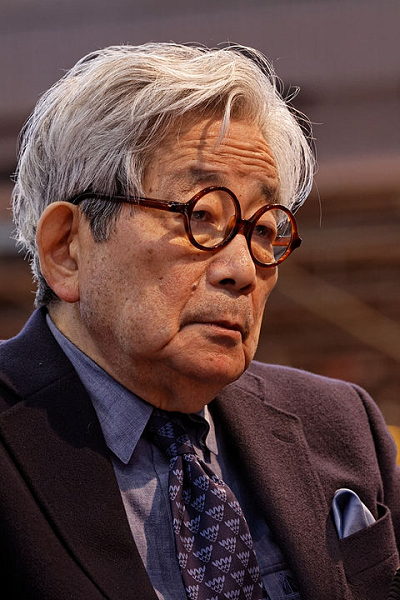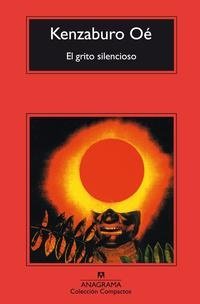Kenzaburō Ōe en su grito silencioso (Esp | Eng)
ESP
Hace un año, el 3 de marzo de 2023, murió el novelista japonés Kenzaburō Ōe , quien fuera el segundo Premio Nobel de Literatura para un japonés, otorgado en 1994 (el primero lo recibió Yasunari Kawabata en 1968). Nació en la isla de Shikoku en 1935, y, como buen japonés, tuvo una vida sin alardes, dedicada a su oficio de escritor, desde el cual ejerció modestamente cierta influencia en contra del espíritu bélico y por el destino ecológico y no destructivo de la energía nuclear.
ENG
One year ago, on March 3, 2023, the Japanese novelist Kenzaburō Ōe , who won the second Nobel Prize for Literature in 1994 (the first was awarded to Yasunari Kawabata in 1968), died. He was born on the island of Shikoku in 1935, and, as a good Japanese, had an unostentatious life, dedicated to his profession as a writer, from which he modestly exerted some influence against the spirit of war and for the ecological and non-destructive destiny of nuclear energy.

Escribió una obra narrativa, sobre todo novelística, de importantes títulos, como el que ahora citaré y comentaré: El grito silencioso, novela publicada originalmente en 1967, pero reeditada y traducida posteriormente varias veces. Se sabe que la obra de Kenzaburō Ōe está muy impregnada por su autobiografía, como es la experiencia de la Segunda Guerra Mundial, un hijo con discapacidad cerebral, entre otros.
He wrote a narrative work, mostly novelistic, of important titles, such as the one I will now quote and comment on: The silent cry, originally published in 1967, but subsequently republished and translated several times. Kenzaburō Ōe's work is known to be heavily steeped in autobiography, such as the experience of World War II, a brain-disabled son, among others.
En El grito silencioso están presentes estos aspectos, abordados desde la vuelta al pueblo natal de dos hermanos –Mitsu y Taka–, confrontados con las duras experiencias de un amigo suicidado, una esposa alcohólica (en el caso de Mitsu) y un destino por hacer.
These aspects are present in the story of The silent cry, approached from the return to the hometown of two brothers -Mitsu and Taka-, confronted with the harsh experiences of a suicidal friend, an alcoholic wife (in the case of Mitsu) and a destiny to be fulfilled.

Al despertarme, siempre busco ansioso el sentimiento de la ardiente "esperanza" perdida. No es un sentimiento d carencia, sino un anhelo positivo de "esperanza" ardiente en sí. Al comprender que no me es posible encontrarla, trato de desligarme hacia la pendiente del segundo sueño. ¡Duerme, duerme, el mundo no existe!
When I wake up, I always anxiously look for the feeling of the burning lost hope. It is not a feeling of lack, but a positive longing for the burning hope itself. Realizing that it is not possible for me to find it, I try to disengage myself towards the slope of the second dream. Sleep, sleep, the world does not exist!

Me entran ganas de llorar y vuelvo a sentir el cansancio que me invadió mientras estuve junto al lecho de muerte de mi amigo, un cansancio que tiñe de negro cada rincón de mi cuerpo.
–¡Estás como un cuba!
–No estoy tan borracha. Si sudo, es por el miedo, ¿sabes?
–¿De qué tienes miedo? ¿Te asusta el futuro del nene?
-¡Me asusta que haya personas que se pinten de rojo la cabeza y se suiciden!
I feel like crying and I feel again the tiredness that invaded me while I was at my friend's deathbed, a tiredness that stains every corner of my body black.
-You're drunk as a skunk!
-I'm not that drunk. If I sweat, it's because of fear, you know?
-What are you afraid of? -Are you afraid of the baby's future?
-I'm afraid of people painting their heads red and committing suicide!

Se me ocurrió entonces que la causa de mi desazón tal vez fuera que, en el fondo, me daba cuenta de que quienes les sobreviven no pueden hacer nada por los muertos.
It then occurred to me that the cause of my uneasiness might be that, deep down, I realized that those who survive them can do nothing for the dead.

–"¿Puedo decirte la verdad?" –dijo, creo que con la misma voz con que le había dicho esas palabras a mi amigo en Nueva York– es un verso escrito por un joven poeta, y que en aquellos tiempos yo lo repetía continuamente. Pensaba por aquel entonces en la verdad absoluta, la que, si un hombre la dice, no le deja más alternativa que morir a manos de otros, suicidarse o volverse loco y convertirse en un monstruo inhumano cuyo aspecto horrorizaba. Esa verdad, una vez sale de la boca, es como una bomba en la que han puesto en marcha el detonador, imposible detener. Mitsu, ¿crees que una persona normal, de carne y hueso, puede decirles esa verdad a los demás?
-"May I tell you the truth?" -he said, I think in the same voice with which he had said those words to my friend in New York- it is a verse written by a young poet, and which in those days I repeated it continually. I was thinking at that time of the absolute truth, which, if a man speaks it, leaves him no alternative but to die at the hands of others, to commit suicide, or to go mad and become an inhuman monster whose appearance horrified. That truth, once it comes out of the mouth, is like a bomb in which the detonator has been set off, impossible to stop. Mitsu, do you think a normal, flesh-and-blood person can tell that truth to others?

–(...) ¿Qué pasa con los escritores? Los hay que han dicho la verdad por medio de una novela y han seguido viviendo, ¿no?
-¿Los escritores? Es verdad que dicen cosas que se aproximan a la verdad, y que siguen viviendo sin que los maten a golpes y sin volverse locos. Esos individuos engañan a los demás con el entramado de su ficción.
-(...) What about writers? There are those who have told the truth through a novel and have gone on living, right?
-Writers? It is true that they say things that are close to the truth, and that they go on living without being beaten to death and without going crazy. Those individuals deceive others with the web of their fiction.

Puede notarse en los fragmentos que he escogido de El grito silencioso, la visión con la que nos confronta el escritor japonés. A través de la narración en primera persona de Mitsu, accedemos a una valoración –diría– existencialista de la vida (Kenzaburō Ōe no sólo leyó a Jean-Paul Sartre sino que también lo conoció cuando estuvo en París). El encuentro con la verdad y la esperanza que podría existir a partir de ella nos colocan quizás ante el dilema que nos sigue inquietando en este presente.
It can be noted in the fragments I have chosen from The Silent Scream, the vision with which the Japanese writer confronts us. Through Mitsu's first-person narration, we gain access to an -I would say- existentialist assessment of life (Kenzaburō Ōe not only read Jean-Paul Sartre but also met him when he was in Paris). The encounter with truth and the hope that could exist from it perhaps place us before the dilemma that continues to trouble us in this present.
Referencias | References:
Ōe, Kenzaburō (1996). El grito silencioso. España: Círculo de Lectores.






Esta publicación ha recibido el voto de Literatos, la comunidad de literatura en español en Hive y ha sido compartido en el blog de nuestra cuenta.
¿Quieres contribuir a engrandecer este proyecto? ¡Haz clic aquí y entérate cómo!
https://inleo.io/threads/josemalavem/re-josemalavem-h5snbb3t
The rewards earned on this comment will go directly to the people ( josemalavem ) sharing the post on LeoThreads,LikeTu,dBuzz.